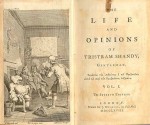I interviewed Jennifer Egan for the great literary online magazine The Rumpus. You can read it in full here, but here’s a teaser:
Look at a book like Tristram Shandy , which is so crazily experimental in a way we still have yet to match. There’s such a desire not to just say: this happened and then this happened and then this happened. The tension is between the incremental and inexorable passage of time and the leaping, stuttering quality of consciousness. The two do not match up. One result of that is that time is passing gradually, but we experience its effect as very sudden. Our perception of time is full of all these gaps. That really interests me, and I think it informed the fragmented structure of the book. I wanted to capture as many shocking discoveries of time having passed as possible, which is difficult to do if you’re just moving forward in time.
, which is so crazily experimental in a way we still have yet to match. There’s such a desire not to just say: this happened and then this happened and then this happened. The tension is between the incremental and inexorable passage of time and the leaping, stuttering quality of consciousness. The two do not match up. One result of that is that time is passing gradually, but we experience its effect as very sudden. Our perception of time is full of all these gaps. That really interests me, and I think it informed the fragmented structure of the book. I wanted to capture as many shocking discoveries of time having passed as possible, which is difficult to do if you’re just moving forward in time.